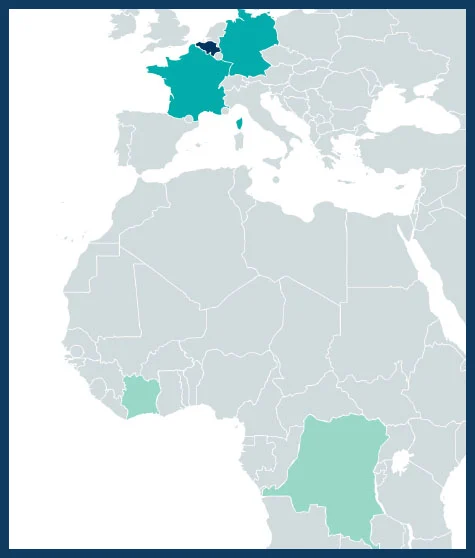01/03/2020 – 28/02/2023
€ 950,820
Prof. Dr. Herwig Leirs
herwig.leirs@uantwerpen.be
Coordinator: Biology – University Antwerp – Antwerp – Belgium
Operational Directorate Taxonomy and Phylogeny – Royal Belgian Institute of Natural Sciences – Brussels – Belgium
Biodiversity Monitoring Centre – University of Kisangani – Kisangani – DR Congo
National Biomedical Research Institute – Kinshasa – DR Congo
VIH and infectious diseases (TransVIHMI) – IRD/ University of Montpellier/Inserm– Montpellier – France
Epidemiology of highly pathogenic microorgansims – Robert Kock Institute – Berlin – Germany
OneHealth for all – Bingerville – Ivory Coast

Biodiversity loss has increased significantly on the African continent, due to deforestation, bushmeat consumption, pesticide use, etc., and is predicted to continue doing so in the forthcoming decades. Yet, as recognised by the “One Health” concept, changes in biodiversity can impact human health and wellbeing. In particular, the dilution effect hypothesis suggests that higher biodiversity mitigates the risk of transmission of infectious agents; but in reverse, biodiversity loss may have a huge impact on the incidence and transmission of zoonotic diseases. However, high biodiversity can also result in more transmission events, e.g. since more potential reservoir species are available. Yet both convincing evidence and a thorough understanding of the underlying mechanisms are lacking to respond to these questions.
BIODIV-AFREID will investigate how biodiversity conditions (dis)favour transmissions of infectious agents from small mammals into human populations in African forests. It will:
• link changes in biodiversity to changes in communities of reservoirs and the pathogens they carry;
• link differences in these reservoir communities to human health. The study will include a variety of viruses (Arenaviruses, Coronaviruses and Hantaviruses) but will have a specific focus on two pathogens with an increasing frequency: Ebola and Monkeypox virus. Both are emerging from the African rainforest and cause major concerns for public health.
To achieve these objectives, BIODIV-AFREID will:
• Determine the diversity and abundance of potential small mammal reservoirs for sites in Democratic Republic of the Congo and Ivory Coast, based on already available as well as newly collected small mammal specimens, bushmeat samples and blood-fed arthropods;
• Screen samples for the presence of different pathogens. Diversity and evolutionary history of the pathogens will be investigated with whole genome sequencing.
• Correlate levels of disturbance (distance to human settlement, degree of deforestation, intensity of bushmeat hunting) to biodiversity and abundance of potential reservoirs, and to changes in the transmission and persistence of pathogens;
• Characterise pathogen strains in humans will be characterised with whole genome sequencing and compared to those in wild animals. Reservoir and pathogen diversity and frequency of human-wildlife interactions will be linked to the level of infection on humans. The risk for spillover of wildlife infections to humans will be modelled.
Through these insights, BIODIV-AFREID will seek to inform the development of more targeted conservation and public health strategies for the control or response to zoonotic disease transmissions. The expected outcome will strengthen international and national authorities dealing with the management of health risks resulting from wild species hunting, bushmeat consumption, and zoonotic agents causing emerging diseases in African tropical lowland forests. Results are expected to significantly help the IUCN in taking a leading role in clearly explaining the close links between biodiversity (deforestation, bushmeat) and epidemic dis- eases, while emphasising the need for an integrated approach in the protection of biodiversity and human health in the context of the Convention of Biological Diversity. To achieve this, BIODIV-AFREID will organise stakeholder workshops at the start and end of the project, some targeting key organisations and pro- cesses at the international level and others focused on collaborating at the local level, while field trips and participation to international OneHealth events are also planned in the course of the projects. In addition, project results will be summarised in a series of policy briefs co-developed with local authorities, management and civil society actors to inform government agents responsible for public health in both the Democratic Republic of Congo and Ivory Coast.